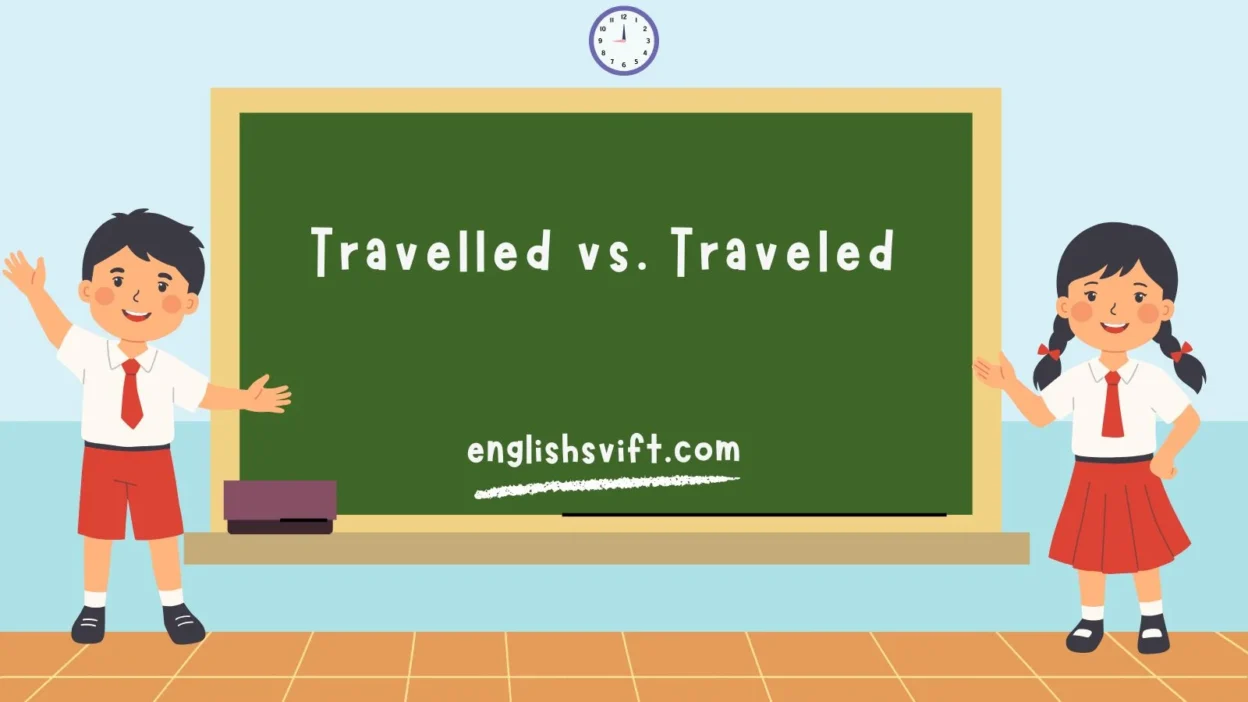If you’ve ever written “travelled” and second-guessed yourself because someone else wrote “traveled,” you’re not alone. This spelling debate has caused confusion for writers, students, and even seasoned editors. The good news? Both spellings are correct—but they carry different regional and stylistic implications. Whether you’re crafting a research paper, writing a blog, or penning a travel diary, understanding the difference between “travelled” and “traveled” ensures your writing is consistent, professional, and polished.
In this guide, you’ll discover grammar tips, regional preferences, historical origins, and practical examples. You’ll also get access to tables for quick reference, making this your go-to resource for nailing English spelling variations.
Understanding the Core Difference: Travelled vs. Traveled
Both “travelled” and “traveled” are the past tense and past participle forms of the verb “travel.” The difference comes down to regional spelling conventions:
| Spelling | Region of Use | Example Sentence |
| Travelled (double “l”) | British English, Australian English, Canadian English, New Zealand English | “She travelled through Europe for her summer vacation.” |
| Traveled (single “l”) | American English | “He traveled across the United States in a camper van.” |
This distinction applies not just to this verb but to many words in English where British spelling doubles consonants and American spelling prefers a streamlined version.
The Role of American and British English in Spelling Variations
English evolved differently across the Atlantic. In the US, spelling reforms by Noah Webster favored simplicity: drop extra letters when possible. Meanwhile, British English kept older linguistic traditions.
- British English tends to double consonants before suffixes like -ed and -ing.
- American English opts for single consonants for ease of writing.
This isn’t just about “travelled.” It’s part of a larger spelling system that affects words like “labelled/labeled” and “cancelled/canceled.”
Quick Grammar Table: Travelled vs. Traveled in Action
| Form | British English Example | American English Example |
| Past Tense | She travelled to Madrid. | She traveled to New York. |
| Past Participle | We have travelled a lot. | We have traveled a lot. |
| Gerund/Participle | Travelling is exciting. | Traveling is exciting. |
Why Double “L” Exists in British English
The double “l” in British English follows traditional spelling patterns influenced by French and Latin. When adding suffixes to words ending in a single vowel followed by “l,” British English doubles the “l” to maintain pronunciation consistency.
Example:
- Travel → Travelled
- Cancel → Cancelled
- Label → Labelled
This pattern extends to traveller, counsellor, and jeweller.
Single “L” in American English: A Simpler Approach
Americans value simplicity and efficiency in spelling. Webster’s dictionary reforms in the early 1800s advocated removing unnecessary letters. That’s why “traveled” and “traveled” became standard.
American Style Examples:
- Traveled instead of Travelled
- Labeled instead of Labelled
- Canceled instead of Cancelled
Travelled vs. Traveled in Past Tense and Past Participle Usage
Both versions mean the same thing:
- Past tense: Describes a completed action.
- Past participle: Used with auxiliary verbs (have, had, has).
| Verb Form | British English | American English |
| Simple Past | She travelled to Ireland. | She traveled to Ireland. |
| Past Participle | They have travelled far. | They have traveled far. |
Present Participle and Gerund Forms: Travelling vs. Traveling
Just like “travelled/traveled,” travelling/traveling follows the same rules.
| Spelling | Region | Example |
| Travelling | UK, AU, CA, NZ | “Travelling broadens your mind.” |
| Traveling | US | “Traveling is one of my passions.” |
Common Grammar Rules for Adding “-ed” and “-ing” to Verbs
Here’s a simple rule table:
| Base Verb Ending | British English Rule | American English Rule |
| Single vowel + l | Double the “l” (travel → travelled) | Keep one “l” (travel → traveled) |
| Other endings | Same for both versions (walk → walked) | Same for both versions (walk → walked) |
When to Use “Traveler” vs. “Traveller”
- Traveler (US): “The traveler packed light.”
- Traveller (UK): “The traveller stopped for tea.”
Fun fact: “Travellers” is also the term for a distinct ethnic community in Ireland, known as Irish Travellers.
Real-Life Examples of Travelled and Traveled in Writing
| Source | Sentence Example |
| The Washington Post | “She traveled to New York for business.” |
| The Guardian | “He travelled extensively during his career.” |
| Academic Papers | “This study examined patients who had travelled internationally.” |
Style Guides: AP Style, MLA, Chicago, and Academic Consistency
Academic style guides emphasize consistency. Choose one version and stick with it throughout your paper or blog.
| Style Guide | Preferred Form |
| AP Style | Traveled (US) |
| MLA | Based on region |
| Chicago | Based on audience |
Regional Spelling Differences: US, UK, Canada, Australia, India, and Beyond
| Region | Preferred Spelling |
| United States | Traveled |
| Canada | Travelled |
| UK | Travelled |
| Australia | Travelled |
| India | Travelled |
The Historical Origin of the Word “Travel”
“Travel” comes from the Old French word ‘travail’, meaning labor or toil. In medieval times, travel was associated with hardship, not leisure.
A Look at Common Spelling Differences: Color vs. Colour, Behavior vs. Behaviour
| Word Pair (US vs. UK) | American English | British English |
| Color vs. Colour | Color | Colour |
| Behavior vs. Behaviour | Behavior | Behaviour |
| Canceled vs. Cancelled | Canceled | Cancelled |
Travel Writing Tips: Choosing the Right Form for Your Audience
If your audience is primarily American, use “traveled.” If your readers are global, British spelling may resonate. Always consider context, tone, and branding.
Idioms and Expressions About Travel in English
Some idioms to spice up your writing:
- “Hit the road”
- “Off the beaten path”
- “A rolling stone gathers no moss”
- “Travel broadens the mind”
Academic and Professional Writing: Consistency in Spellings
In academic essays, research papers, and dissertations, pick one spelling style and apply it throughout. Inconsistent spelling can reduce credibility.
A Comparative Table of Regular and Irregular Verb Spellings
| Verb | American English | British English |
| Traveled | Traveled | Travelled |
| Labeled | Labeled | Labelled |
| Canceled | Canceled | Cancelled |
Travelled vs. Traveled in Journalism: Examples from Major Newspapers
| Publication | Preferred Spelling |
| The New York Times | Traveled |
| BBC News | Travelled |
| The Washington Post | Traveled |
How Spell Checkers and Grammar Tools Handle Travelled vs. Traveled
Most tools like Grammarly, QuillBot, and Microsoft Word automatically detect your regional settings.
Real-Life Usage Trends: Which Version is More Popular in 2025?
Google Trends shows “traveled” dominating in the US, while “travelled” remains strong in Commonwealth countries.
Synonyms and Related Words for Travelled and Traveled
| Synonym | Usage Example |
| Journeyed | “He journeyed across Asia.” |
| Roamed | “She roamed the countryside.” |
| Explored | “They explored new territories.” |
Common Mistakes and How to Avoid Them
- Mixing British and American spellings in one article.
- Forgetting to adjust spell checker settings.
- Overcomplicating writing with unnecessary switching.
Key Takeaways: Choosing Travelled vs. Traveled Confidently
- Both spellings are correct.
- Use traveled for American audiences.
- Use travelled for British/Commonwealth readers.
- Consistency is key in all forms of writing.
FAQs
Q1: Is “travelled” wrong in American English?
No, it’s not wrong, but it’s uncommon. Americans prefer “traveled.”
Q2: Should I use “travelled” in academic writing?
Use whichever spelling matches your style guide and region, but stay consistent.
Q3: Is “travelling” British or American?
“Travelling” is British, “traveling” is American.
Q4: Do newspapers follow these rules?
Yes, major newspapers like The Washington Post (US) use “traveled,” while The Guardian (UK) uses “travelled.”
Q5: What about other words with double “l”?
The same rule applies: labelled/labeled, cancelled/canceled, modelled/modeled.
Conclusion
The “travelled vs. traveled” debate is less about right or wrong and more about regional preference and consistency. Both forms are correct, but they signal your writing style and target audience. Whether you’re working on a blog post, academic paper, or travel guide, understanding these spelling variations adds clarity and professionalism. In a globalized world, mastering small details like this makes your writing stand out.



